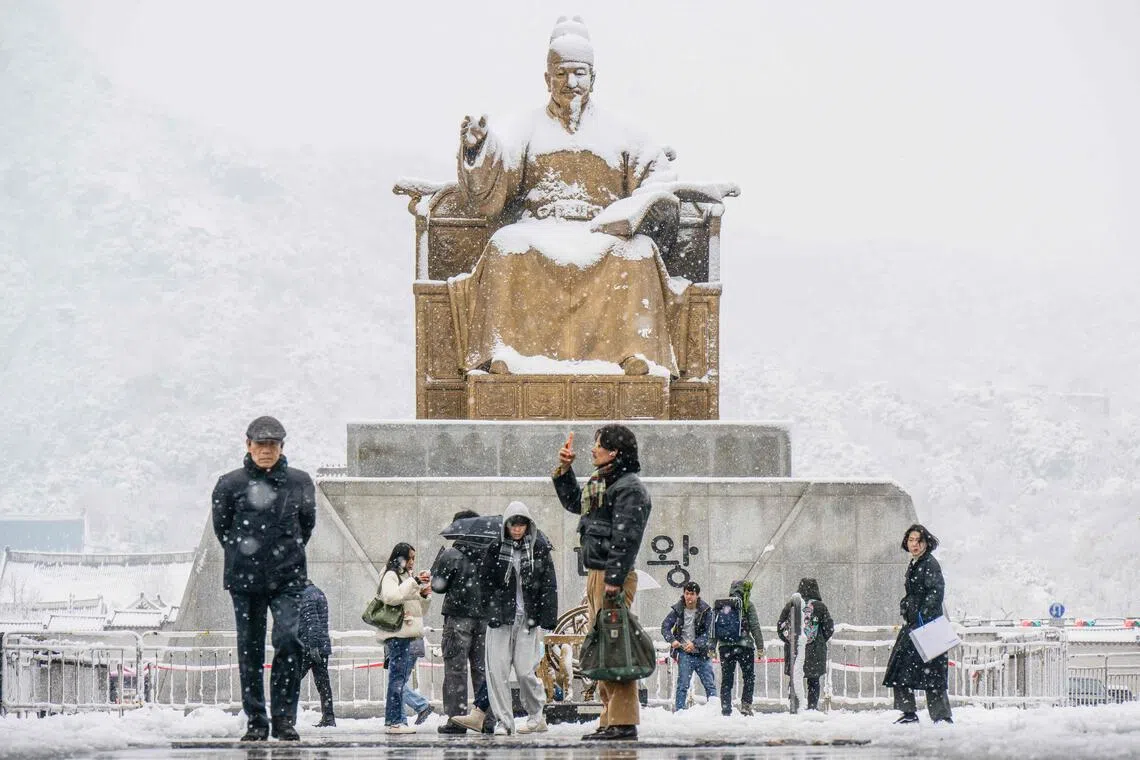Meet the mystery editor behind most of the Wikipedia pages on South Korea
Sign up now: Get insights on Asia's fast-moving developments

Of all his contributions, he is proudest of his article on Sejong the Great, who was the Korean king from 1418 to 1450.
PHOTO: AFP
Follow topic:
SEOUL – When outsiders think of South Korea, the image that comes to mind is often limited to BTS, Squid Game or North Korea. But behind those snapshots are millions of ordinary South Koreans, and much of their history and culture remains invisible online.
A Korean American Wikipedian who has spent years editing the world’s largest online encyclopedia says too much of what global readers find about South Korea is biased, incomplete or simply missing – and he has made it his mission to change that. Through Wikipedia, he hopes readers can learn about South Korea with more depth and balance.
“The ‘dark side of South Korea’ narratives are excessively one-dimensional. They’ve gained a lot of traction online,” Grapesurgeon, who wished to be identified only by his username, said in an interview with The Korea Herald.
“These narratives often condescendingly mock South Korea, ignore its positive qualities, hyperfocus on its problems and ignore the historical and geopolitical conditions that led to its current state. Often, these people blame South Korea’s problems on average South Koreans that can do little to change the system, and not geopolitics or the rich and powerful that are at the root of these problems.”
Average people do not deserve to be mocked for problems they did not create, he added.
Editing almost exclusively on South Korea
Born in the United States and raised in South Korea, he is one of the most active Wikipedians of all time – the 641st most active user globally – with around 130,000 edits across accounts. On the English Wikipedia, there are about 42,000 articles about Korea, and he has edited most of them at least once.
“I have written around 600 articles (in) total. Major articles include Sejong the Great, Gyeongbokgung, the March First Movement, Changdeokgung and Kim Ku,” he said.
Still, he admits most of the Korea-related content on the platform is far from satisfactory.
“Our best articles are on South Korean pop culture, the Korean War, North Korea and South Korean social issues. Most of everything else is really poor. This includes Korean history, including Taejo of Joseon and Shin Saimdang, South Korean literature and even major cities like Busan.”
Because political and social issues often attract other English-language editors, he instead focuses on subjects that are important but neglected.
Of all his contributions, he is proudest of his article on Sejong the Great, who was the Korean king from 1418 to 1450.
“To my knowledge, that article is one of the most complete English-language writings on him ever produced,” he said.
“I don’t know of any comprehensive English-language biographies on him. I’ve searched very hard. My article uses basically every English-language academic book and paper that mentions his name from the last 40 years that I can find. Also, I translated several Korean-language works for the article. I’m proud to have made all of this available to the public for free.”
Sometimes, the topics he covers gain unexpected popularity later.
His entry on ddakji, a traditional South Korean game, surged to 350,000 views after the game was featured in Netflix’s hit series Squid Game.
“You could see views spike each time a new season of Squid Game was released,” he said.
Lack of contributors
Surprisingly, his journey into Korean studies only began after he stumbled onto a poor Wikipedia entry.
“I wasn’t interested in Korean studies at all until I started editing Wikipedia. It began when I noticed how awful the article on Kim Ku (a leader of the South Korean independence movement during the Japanese occupation of South Korea) was. While trying to fix it, I became fascinated with what I was reading, and I’ve been hooked ever since.”
Wikipedia’s significance, he added, goes beyond casual readers. “AI models are now trained off of it and retrieve information from it. Directly and indirectly, a huge portion of the world learns about Korea through Wikipedia. Unfortunately, most articles about Korea on Wikipedia are bad. This is a significant liability to South Korea, especially considering its current turbulent geopolitical position.”
Despite mostly avoiding controversial topics, he edits under a pseudonym.
“It’s becoming less safe to edit Wikipedia,” he explained. “Governments are becoming increasingly invasive and authoritarian, and it’s hard to predict what will become taboo in the future. And even besides governments, online behaviour is not getting any better, only worse.”
But the bigger challenge is the lack of manpower to edit topics on South Korea.
“We have very few (probably fewer than 10) regular editors on South Korea topics (excluding pop culture and North Korea), and only a fraction of us are Korean speakers. There are around 42,000 articles about Korea on the English Wikipedia. We don’t have enough people to manage those and write more.”
He encourages newcomers to join WikiProject Korea, a community dedicated to improving Korea-related articles.
“Start small. Popular or controversial articles are more difficult to edit; avoid those until you’re experienced,’ he advised. “Be patient and collegial. Disagreements are literally part of Wikipedia’s design.”
He also urged caution with technology.
“Avoid using AI to write. Many on the English Wikipedia are infamously not fans of AI writing. Sloppy use of AI in discussion is prohibited; use your own words. The Korean Wikipedia is more receptive to AI writing, however.”
As for advice, he added that reliable sources must always be cited, personal opinions must be left out, and Korean-language sources are valid, though English sources are preferred for accessibility. THE KOREA HERALD/ASIA NEWS NETWORK

